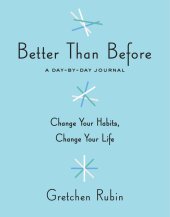 Neuerscheinungen 2015Stand: 2020-02-01 |
Schnellsuche
ISBN/Stichwort/Autor
|
Herderstraße 10
10625 Berlin
Tel.: 030 315 714 16
Fax 030 315 714 14
info@buchspektrum.de |

Gretchen Rubin
Better Than Before
A Day-by-Day Journal
2015. 336 S. 7.3000 in
Verlag/Jahr: RANDOM HOUSE US; POTTER STYLE 2015
ISBN: 0-553-45929-5 (0553459295)
Neue ISBN: 978-0-553-45929-6 (9780553459296)
Preis und Lieferzeit: Bitte klicken
Part resource, part tool, part keepsake, this companion journal to Gretchen Rubin´s New York Times bestselling book Better Than Before will guide you through the important changes in your life.
Habits are the key to all our successes and challenges in life, and there is no better way to change your habits than to track them. Better Than Before: A Day-by-Day Journal provides you with a year´s worth of writing prompts that help you identify habits you´d like to change and strengthen habits you wish to adopt, as well as helpful quizzes and eye-opening tips on habit formation. Each weekly entry also features "habit-tracker" to mark down specific goals both big and small. As the pages fill, you´ll discover your own unique path-a practical, concrete framework that helps you to understand your habits and to change them for good.
A NOTE TO THE READER
Better Than Before tackles the question: How do we change ? One answer-by using habits.
Habits are the invisible architecture of daily life. We repeat about 40 percent of our behavior almost daily, so our habits shape our existence, and our future. If we change our habits, we change our lives.
But that observation just raises another question: Okay, then, how do we change our habits ? That´s what this book seeks to answer.
But while Better Than Before explores how to change your habits, it won´t tell you what particular habits to form. It won´t tell you to exercise first thing in the morning, or to eat dessert twice a week, or to clear out your office. (Well, actually, there is one area where I do say what habit I think is best. But only one.)
The fact is, no one-size-fits-all solution exists. It´s easy to dream that if we copy the habits of productive, creative people, we´ll win similar success. But we each must cultivate the habits that work for us . Some people do better when they start small; others when they start big. Some people need to be held accountable; some defy account- ability. Some thrive when they give themselves an occasional break from their good habits; others when they never break the chain. No wonder habit formation is so hard.
The most important thing is to know ourselves , and to choose the strategies that work for us.
Before you begin, identify a few habits that you´d like to adopt, or changes you´d like to make. Then, as you read, consider what steps you want to try. You may even want to note today´s date on your book´s flyleaf, so you´ll remember when you began the process of change.
To help you shape your habits, I regularly post suggestions on my blog, and I´ve also created many resources to help you make your life better than before. But I hope that the most compelling inspiration is the book you hold in your hands.
I see habits through the lens of my own experience, so this ac- count is colored by my particular personality and interests. "Well," you might think, "if everyone forms habits differently, why should I bother to read a book about what someone else did?"
During my study of habits and happiness, I´ve noticed something surprising: I often learn more from one person´s idiosyncratic experiences than I do from scientific studies or philosophical treatises. For this reason, Better Than Before is packed with individual examples of habit changes. You may not be tempted by Nutella, or travel too much for work, or struggle to keep a gratitude journal, but we can all learn from each other.
It´s simple to change habits, but it´s not easy.
I hope that reading Better Than Before will encourage you to harness the power of habits to make change in your own life. Whenever you read this, and wherever you are, you´re in the right place to begin.
IT´S NOT ENOUGH TO BEGIN
Some habit-formation strategies are familiar and obvious-like Monitoring or Scheduling-but others took me more time to understand. As I studied habits, I slowly began to recognize the tremendous importance of the time of beginning.
The most important step is the first step . All those old sayings are really true. Well begun is half done. Don´t get it perfect, get it going. A journey of a thousand miles begins with a single step. Nothing is more exhausting than the task that´s never started, and strangely, starting is often far harder than continuing .
That first step is tough. Every action has an ignition cost: getting myself to the gym and changed into my gym clothes can be more challenging than actually working out. That´s why good habits are a tremendous help: they make the starting process automatic.
Without yet having a name for it, in fact, I´d invoked the power of the Strategy of First Steps as I was starting to write this book.


